Corporate Intelligence

Faisal Ghani
After graduating with an MBA in Sales & Marketing from the Institute of Business Administration (Karachi), one of the oldest business schools outside the United States formed in collaboration with the Wharton School of Finance (University of Pennsylvania), I bring more than 16 years of work experience in the B2B sales and marketing field.
I recently came across an article which highlighted the different types of intelligence quotients.
Previously people were only judged based on their intelligence quotient or IQ. However, it seems our personalities are defined by more than just intelligence. A well-rounded personality is based on the person's emotional quotient (EQ), their social quotient (SQ) and their adversity quotient (AQ).
This got me thinking; do certain managerial positions vary according to the attributes they possess? Are some managers where they are because of the attributes they possess? The following is the result of my deliberations on this matter.
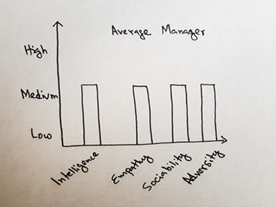
The General Manager
This is a person who has all four attributes. The attributes are present in an average amount so they are not either well-endowed with intelligence, empathy, sociability or ability to withstand adversity, nor are they lacking in any of these departments. This makes them suitable to do any job, however they are unable to excel at anything.
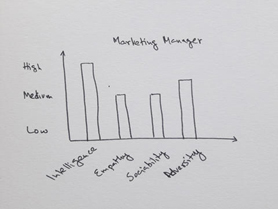
The Marketing Specialist
This manager has a high level of intelligence. After all, analyzing humongous amount of irrelevant data to arrive at meaningful conclusions requires a lot of brain cells. They also possess a better than average degree of ability to withstand adversity. They are a little more sociable than the average manager and only slightly more empathetic though they like to rank themselves higher on these attributes. The practical aspects of their job however do not require high degree of empathy or sociability and as they go deeper down the rabbit hole these skills are not given a chance to develop.
Their interactions with their customers is based mainly on data. Statistics. Numbers. They have reduced their customer's needs, wants, purchase cycles, purchase volumes, market size, market share, growth projections to numbers. Their interaction with real customers, real people has diminished over time therefore their empathy and sociability quotients have taken a hit.
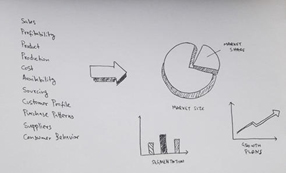
They are however quite adept at handling adversity. This is required so they can take the misses of their marketing plans and still spin out a great story of how their losses are actually wins. Being able to withstand adversity lets them face their management with an audacity which cannot be found elsewhere in the company.
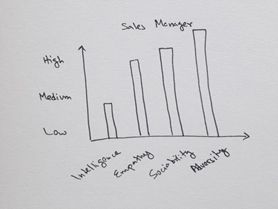
The Sales Professional
If there is anyone in the company that can supersede the Marketing guy in handling adversity, it is the guy or gal in sales. It takes a special kind of person who can follow up on leads, prospects, customers and face rejection on an almost daily basis. They hear the word "No!" on a daily basis, whether it is a request for an appointment, a meeting for negotiation, pitching a product, getting a purchase order, or asking for an overdue payment.
The other advantage they have is that they are highly sociable. They know all the latest gossip which makes them valuable company for many people. They are highly empathetic to the needs of their company as well as the needs of their customers

However, they are a little below than average when it comes to intelligence. After all who in their right mind would accept a lifestyle that includes extensive travel under less than ideal conditions for low pay with constant pressures from their boss and their customers?
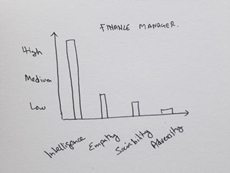
The Finance Person
Probably the most intelligent person in the whole company. They are able to understand complex numbers and projections without relating them to business; and the bosses like them for it. As far as running the business goes, they have no clue how to do it. However, they are able to manipulate numbers and suggest ways to cushion the bottom line.
They are well below average on empathy and sociability. They like to remain hidden in their departments behind stacks of files and spreadsheets. They have no time to interact with anyone in the company choosing to spend their days and nights with their computers and calculators spewing jargon like ROI, payback period, CAGR which makes most people uncomfortable and they keep their distance from them as much as possible (except when it is time for salaries and increments).

They are below average on their ability to withstand adversity though. The first sign of trouble and they are the first ones to abandon the company. When you hear companies that had overinflated figures and fudged up projections, that too indicates the inability of the Finance guy to withstand adversity. Rather than face up to the fact that sales are low, profits are down and payables are piling up, they present a rosy picture to the management and shareholders hoping to ride through the turbulence so they can find the opportunity to switch before anyone finds out the truth. Just take a look at the turnover in your company's Finance department and you will understand what I am talking about.
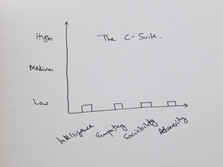
The C-Suite
The C-Suite is comprised of a very special breed of people. These are the people with the words Chief and Officer in their titles. The middle initial stands for an arbitrary task which they seldom to never perform. If you want to find out what this means, just try to get the Chief Information Officer to fix your laptop or try to explain how VLOOKUP works in Excel.
The C-Suite is the part of the organization where everything is below par. Seems that to qualify for a position in the C-Suite you need to have lower than average intelligence, lower than average empathy and social skills as well as a very low ability to withstand adversity. The intelligence of the C-Suite can be gauged by listening to their conversations on vision and mission of the company which makes absolutely no sense with the practicality of the business. When they talk, you wonder the whole time how this person does not walk into doors more often (a lot of times in fact they do.)
They are less attuned to empathy which makes them suitable to make cutthroat decisions like mass layoffs while at the same time procuring a brand new BMW as part of their perks. They justify paychecks which are 100 to 200 times higher than the average worker while working less. The most stress they feel is on the golf course (the membership of which is also a perk) while their workers slave away at double shifts to ensure the company makes enough to keep their memberships current.
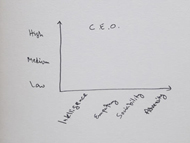
They are also less sociable than most people choosing to hide behind closed doors (despite claims of open-door policies). And while we are on the subject, they like to hide behind policies. They spend hours crafting rules which make them less approachable and more authoritative in order to awe the people who work under them.

As intelligence, empathy, sociability and ability to withstand adversity approach zero, the CEO is born. The designation may be different, but the person is the same. The CEO is the most revered person in the company. Yet for the most part the CEO is the most useless. Ask them what their products, who their customers are, what their company stands for and they will have no idea. Their response will be to quote the company's mission and vision policies which were crafted by some consultant charging exorbitant fees.
They are individuals of diminished intelligence who cannot give you an honest answer, are not approachable under even the most casual social settings and remain with the company as long as it is smooth sailing. Since however, they do control or have access to a lot of information, they ensure that they exit the company before any turbulence hits. Meanwhile, they have managed to secure a hefty CEO package both while in the company and as they exit the company, while all the ordinary workers are left clutching the dust that the company turns into.
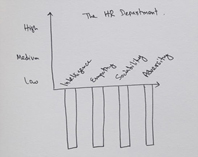
HR
Now while the quotients in the CEO approach to zero, all the quotients measured in the HR are in the negative. They are the least intelligent of the bunch. After all what intelligent person ever opted for HR as their major? It is the last major anyone ever opts for. Hr is what is left after all the cream is taken by the Finance and Marketing departments.

HR has no idea of the how the company they work for operates, what the workers do, what they produce, how they produce it or who buys their product. They therefore have no idea what qualities are required for the different people who make up the workforce. That is the reason when there is a time to make or update a job description, the task falls on the shoulders of the line manager.
They also have no idea where the company is going therefore, they cannot make any succession plans, design job growth, or training schedules. All of these are done through the help of line managers. Heck, they can't even recruit let alone groom and grow a person.
They have no idea what compensation commensurate to qualifications and skills means. It is just fancy mumbo jumbo they use to justify the measly pay they give you which is budgeted by the Finance Department.
And while HR has not learnt what being HR means, they are quick to transfer all the HR functions to automated bots relying on bots to select candidates, schedule interviews, onboard employees, provide trainings, conduct evaluations and so on. The only function they have is to fulfill ISO requirement of having an HR department, otherwise there is no functional requirement of HR at all.
So now that you know who is who, where do you stand within your company?
